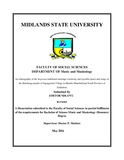Please use this identifier to cite or link to this item:
https://cris.library.msu.ac.zw//handle/11408/2356| Title: | An ethnography of the hogwana traditional marriage ceremony and tjigubhu dance and songs of the Bakalanga people of Sigangatsha Village in Matobo Matabeleland South Province of Zimbabwe. | Authors: | Ndlovu, Editor | Keywords: | Ethnography. Hogwana traditional marriage ceremony. Tjigubhu dance and songs. Bakalanga people. |
Issue Date: | May-2016 | Publisher: | Midlands State University | Abstract: | The researcher presents an ethnographic study of the hogwana ceremony and tjigubhu dance and songs that are performed by the Bakalanga people of Sigangatsha village in Matabeleland South in Zimbabwe. There is limited literature based on the study hence the researcher developed the concept from a broader view by looking at African traditional ceremonies and music. She then narrowed down to the specific ceremony under discussion. Research questions were formulated in Chapter One and their answers sought during field work. In terms of Methodology, the researcher employed the qualitative approach which required her to embark on a field trip and engage in participant observation. Semi-structured interviews and participant observations were employed to generate data. To identify participants suitable for the research, both purposive and snowball sampling were used. Research findings revealed how valuable the hogwana ceremony is to the Bakalanga people. Up to date there are some families that upholds it. It is a ceremony that is meant to bring the two families together and the village at large. There are some preparations that precede the actual ceremony and they have been tabulated in the document. The researcher discovered that the frequency of the hogwana ceremony has deteriorated of late which is a cause of serious concern. As she carried out the study she found out that some of the causes could be the escalated drought in the region which has affected the harvests drastically and hence people no longer have grains. Modernisation has also played a part, youth of nowadays think that such ceremonies are old fashioned and outdated. Intermarriages and the use of grinding mills have been some of the aspects pointed out by informants. Therefore, having noted the decline the researcher felt compelled to carry out a study and provide information as a point of reference for future generations who will not live to witness such ceremonies. The dance and songs are still prevalent though mostly performed out of context. | URI: | http://hdl.handle.net/11408/2356 |
| Appears in Collections: | Bsc Music And Musicology Honours Degree |
Files in This Item:
| File | Description | Size | Format | |
|---|---|---|---|---|
| Editor Ndlovu.pdf | Full text | 2.13 MB | Adobe PDF |  View/Open |
Page view(s)
286
checked on Feb 14, 2026
Download(s)
228
checked on Feb 14, 2026
Google ScholarTM
Check
Items in MSUIR are protected by copyright, with all rights reserved, unless otherwise indicated.



